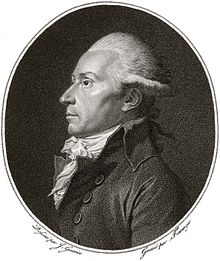Pierre-Victor Malouet
Pierre-Victor Malouet (born February 11, 1740 in Riom , † September 7, 1814 in Paris ) was a high royal official in the colonies and the naval administration during the Ancien Régime . At the beginning of the French Revolution he was one of the spokesmen for the moderate monarchists in the Constituent Assembly . He had to emigrate, returned to France at the time of Napoleon and was under Louis XVIII. Naval Minister.
Life
He was the son of a lawyer. At first he toyed with the idea of joining an order, but then studied law . He also wrote poems and comedies. After completing his studies, he accepted a position at the French legation in Lisbon . After the resignation of the ambassador there, he returned with him to France and entered the administration of the army. After the peace treaty of 1763 , he moved to the Navy and was commissioner in Rochefort . There he was supposed to prepare the passage of colonists to Guiana . In 1767 he was posted to Santo Domingo . A year later he was naval director there. During this time he also began to write again. During the five years in the colonies, he gathered information that he later used in a book on the administration of the colonies. He married and bought several sugar cane plantations.
In 1774 Malouet returned to France. He served the king's sister as secretary for a brief period before being sent to Cayenne to help the colony flourish. The number of settlers could be increased and the colony brought to prosperity. When he wanted to return to France at the beginning of the war with Great Britain in 1779, his ship was hijacked and Malouet was brought to England. A short time later he was released again. In 1780 he became naval director in Toulon .
He was elected to the Estates General of 1789 for the Third Estate in Riom . He advocated reforms along the lines of Great Britain. Overall, he became a spokesman for the moderate monarchists. Although he also called for the unification of the three estates, when the third estate declared itself a national assembly, he vehemently objected. In the constitutional discussion he advocated the introduction of the suspensivvetos, but rejected the declaration of human rights. After the march of the market women ( Poissards ) to Versailles at the beginning of October 1789, he complained about the incitement of the people against individual MPs. He himself was attacked many times during this time. Mirabeau also opposed the desire to censor inflammatory writings . A short time later, however, he supported Malouet against the accusations of a commission of inquiry. For his part, he took part in the criticism against Jean Paul Marat . He also passed a decree against Camille Desmoulins .
In view of the unrest, he pleaded in early 1790 that the king should temporarily be given comprehensive powers. In a tough debate, this request was rejected. With some restrictions he was ready to nationalize church property. He refused the paper money of the assignats . Against the growing influence of the Jacobins , he founded with others the club of the impartial . It was viewed by the public as a monarchist club and was forced to dissolve a short time later.
Even after fleeing to Varennes , he remained a supporter of a constitutional monarchy. He allied with Guillaume Thomas François Raynal . Louis XVI increasingly put his trust in Malouet. In 1792 he found it difficult to escape the September massacre and fled to England. There he published a pamphlet in defense of the king. His offer to defend Louis XVI. to return stayed. In exile he published his letters about the revolution.
In 1801 he returned to France. He worked again for the naval administration and was entrusted with the expansion of the port of Antwerp . For health reasons, he asked for his replacement. After being used elsewhere, he became a member of the Council of State in 1810 . However, he incurred the disfavor of Napoleon. He lost his office in 1812 and was banished from Paris. He lived on an estate that belonged to him. After the Restoration , he rejoined the Navy Ministry and was shortly afterwards from Louis XVIII. appointed Minister of the Navy. He died just a few months later.
Works
- Description of the west Indian island of San Domingo. Weimar 1808. (digitized version)
- Letters about the revolution. Leipzig 1793. (digitized version)
literature
- The big conversation dictionary for the educated stands. Volume 20, Hildburghausen 1851, pp. 414f.
Web links
| personal data | |
|---|---|
| SURNAME | Malouet, Pierre-Victor |
| BRIEF DESCRIPTION | French civil servant and politician |
| DATE OF BIRTH | February 11, 1740 |
| PLACE OF BIRTH | Riom |
| DATE OF DEATH | September 7, 1814 |
| Place of death | Paris |
